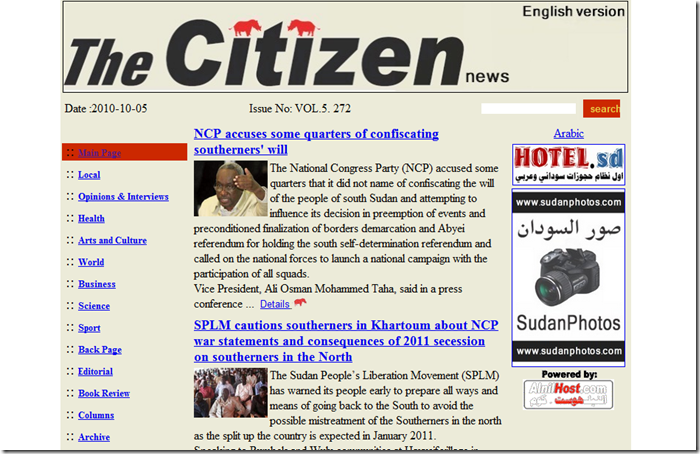
HT: Karuna Herrmann
Probably the best economics blog (previously) in South Sudan

Economists study the most important problems facing the world. At least that is what I thought.Using data put together by Jishnu Das and Quy-Toan Do (at the World Bank), Stefan created this Wordle showing the countries which articles in the top 5 economics journals focus on.
Of course, this does not mean that there is a bias in the editorial policy of the top economics journals. It is perfectly possible that those countries are not very interesting, or that those economists writing papers on these other economies are not very good or that they just don't submit to these journals. And I just saw a pretty pig flying outside my window.
…
Fortunately, development economics has plenty of good journals, such as the Journal of Development Economics.This is the Wordle for JDE articles which are focused on one country:
Latin America is somewhat overrepresented with 30%, India gets 12%, China 11% and Africa 18%.For more details about the data see here.
This is a very strange case of a former US evangelical missionary who makes extraordinary claims which do not seem to be backed up by evidence on the ground. He has been disowned by the local church in southern Sudan and now also by the SPLA. It appears he is raising money on the back of these claims.

The world’s poorest do not communicate with us, which causes us to give less to them than we otherwise would. By contrast, we are bombarded with messages from the well-off, which - on its own - tends to dispose us to be altruistic towards them.and
there are huge costs to being out of sight. Whether it be benefit claimants in the UK or the poor overseas, the mere fact of being anonymous means people are meaner towards you.And so the challenge: if we want to increase altruism towards the world’s poor, how to create a space for communication between them and the citizens of rich countries? Poverty porn? Slum tourism? Fasting? How do we create this engagement whilst respecting the dignity of all involved?
By the end of the 1980s most African countries were indeed in a bad way. The end of the Cold War gave the West - which had always believed it could tell Africans what to do - the chance to impose its own solutions. The West's new agenda was democracy, respect for human rights and the free market.Really Richard? I find the left’s demonisation of the Washington Consensus a bit annoying and a bit of a distraction. The main reason the evil neoimperialist economists recommended that African governments spent less and sold off assets is because they were broke. It’s really not that controversial, you can’t spend more than you earn forever. That’s life.
Africa's economies were handed over to World Bank and IMF economists. "Structural adjustment" introduced a dose of tough economic medicine that would restore the patient to health. Governments were forced to let the "free market" decide the value of their currencies, cut public spending and sell off their assets.
As a theoretical economic solution it might have looked right, but on the ground in Africa it pushed up prices, impoverishing all but a few, and destroying Africa's professional classes by reducing the value of their salaries. Those in power who had mismanaged things so badly, now sold run-down state assets to themselves at knock-down prices.
“Policy making in Europe is like a prizefight: Two contenders, having earned the right to enter the ring, square off against each other for a prescribed number of rounds; when one fighter knocks the other one out, he is declared the winner and the fight is over. Policy making in the United States is more like a barroom brawl: Anybody can join, the combatants fight all comers and sometimes change sides, no referees is in charge, and the fight lasts not for a fixed number of rounds but indefinitely or until everybody drops from exhaustion… ‘it’s never over.’”From Bureaucracy by James Wilson.
once the politician for whom they worked leaves office, their revenue falls 20%, or $177,000 per year, suggesting that lobbyists are paid more for “who they know” than “what they know”.From researchers at LSE and Pompeu Fabra.
What’s that, you want a tenuous development-link and a prize-winner-anecdote from your nobel prize coverage? Happy to oblige.
So the winners are Diamond, Mortensen and Pissarides for their models of “frictional” unemployment, or why job vacancies and unemployment can easily coexist.
In a closed economy that is. And when we speak about labour markets, we generally speak about closed economies. One might also want to ask how incredibly low wages can be so persistent on some parts of a planet, when there is such incredible wealth (and thus demand for cheap labour) on other parts of it. Well, there are some frictions. They would be the armed guards at our borders stopping those poor people from coming and helping us.
For your anecdote; I went to a Summer School taught by Pissarides in Birmingham a couple of years ago. Turns out he is a big Chelsea fan, to the extent that he took a cab for a 200 mile round-trip to make it to a mid-week Chelsea home Champions League match in West London. You have to admire his dedication to his team (,if not perhaps, his particular choice of team).
Check Marginal Revolution for some real coverage.
I’m saddened to see my favorite magazine [The New Yorker] publish an article seemingly in search of every possible fallacy about growth, the main one being that if you have a high growth rate, then the current autocrats and their economist advisors must be Gods…
… another way of stating China’s rapid growth recipe would be something like the following:
Have a succession of crazy autocrats, political chaos, and war savagely repress one of history’s most inventive peoples, along with not allowing one of the most successful trading diasporas in history to operate in China proper. Then have things calm down a bit and have somewhat less crazy rulers allow more of the people’s energy and creativity to burst out. Presto, the change from EXTREME NEGATIVE to LESS NEGATIVE is called a “growth rate,” and it will be high. Now accept worship from around the world.
The Government of Southern Sudan got a fair bit if international ridicule recently for coming up with the plan to build all of its new cities in the shape of animals.
Well you’ll be glad to hear, sources tell me that the official responsible has been fired. Or to be precise, moved to the Ministry of Wildlife. Someone clearly has a sense of humour.
And in any case, this would not have been the first developing country to plan a city in a funny shape. This picture is Brasilia - built in the 50s as an aeroplane or a butterfly, depending who you talk to.
HT: Aban Kwawang
Over 200 million people live outside their country of birth and experience large gains in material well-being by moving to where wages are higher. But the effect of this migration on health is less clear and existing evidence is ambiguous because of the potential for self-selection bias. In this paper, we use a natural experiment, comparing successful and unsuccessful applicants to a migration lottery to experimentally estimate the impact of migration on measured blood pressure and hypertension…From a new Working Paper by John Gibson, Steven Stillman, David McKenzie, and Halahingano Rohorua. David McKenzie is an IPA research affiliate and has lots of interesting research on migration.
the results suggest significant and persistent increases in blood pressure and hypertension, which have implications for future health budgets given the recent worldwide increases in immigration.
Immigrants should pay a bond of £5,000 to cover the costs of using public services, a key ally of David Cameron suggests.Which almost sounds like Gary Becker’s proposal to charge immigrants for entry. Sounds like a good idea to me. If there are health costs to the public purse from migration and migrants are willing to pay those costs out of their massively increased earnings, then why the hell not?
Tory MP Nick Boles - a friend and former aide of the Prime Minister - has urged the Government to impose a ‘surety’ on migrants before granting them visas.
The Bank argues that going forward, a project’s entire implementation process —project design, procurement, contracting, disbursements — should be tailored to fit the context of the environment.
“Uniform application of previous lessons does not work in all contexts, as experience in Sudan has demonstrated,” the bank says. (The East African, Monday October 4 2010)Apologies for the snark, but oh, sometimes…
in 1990 … over 90% of the world’s poor lived in the world’s poorest places. But it looks out of date now. Andy Sumner of Britain’s Institute of Development Studies* reckons that almost three-quarters of the 1.3 billion-odd people existing below the $1.25 a day poverty line now live in middle-income countries. [The Economist]The implication to be drawn; if these countries are middle-income then they can afford to pay for their own poverty-reduction projects right?
Poverty … may be turning from being an international distribution problem into a national one.Not so fast Mr. Sumner. Mr. Ravallion crunched the numbers a few months ago:
The capacity for redistribution in India is far more limited than in China or (especially) Brazil. Indeed, it would be impossible to raise enough revenue from a tax on Indian incomes above the US poverty line to fill India’s poverty gap relative to the $1.25 a day line; the required MTR would exceed 100%. Even at a 100% MTR, the revenue generated could fill only 20% of India’s aggregate poverty gap.’National redistribution projects, such as conditional (and unconditional?) cash transfers are going to become an increasingly important part of the solution to global poverty.
